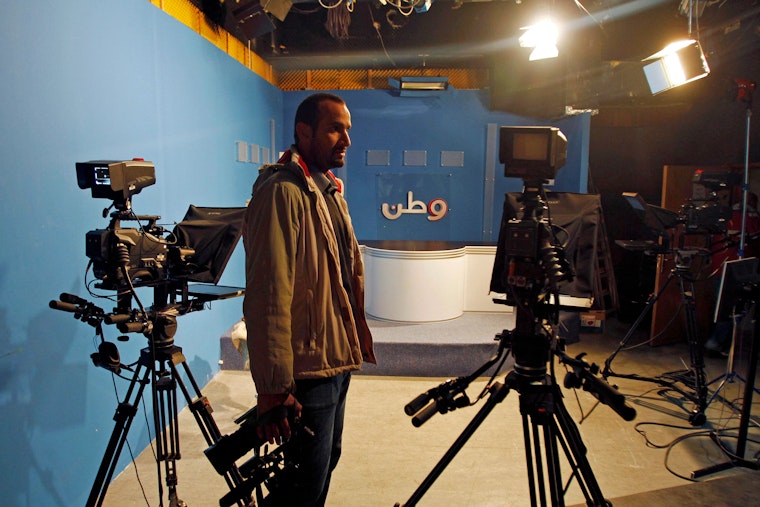Palestine’s First “Civil” Media Organization Is a Breakthrough for Independent Journalism
By Muamar Orabi

In the absence of elections and a functioning legislative council, accountability in Palestine is elusive. Normally, independent media could step in to fill the gap. But media organizations in Palestine have long been either affiliated with a political party, or been private and profit-oriented. Neither model is focused on the well-being of Palestinians or the advancement of open society.
So, in 1996, seeing the need for a media organization that truly has the public interest at heart, a group of civil society organizations established a TV station that is neither governmental nor private. Wattan—Arabic for “homeland”—is Palestine’s first-ever “civil” media organization.
Wattan represented an important breakthrough for independent media in Palestine. A nonpartisan, secular news organization since its inception, it has provided credible, unfettered, and timely media content on a variety of platforms. Though originally known as Wattan TV, our biggest impact today comes through our online presence. We strive to improve media freedoms in Palestine and amplify the voices of those calling for freedom of expression.
Our team of reporters, correspondents, and experts in the West Bank and Gaza Strip provide wide-ranging reporting and programming on issues of public concern, including sensitive and controversial topics such as honor killings, public sector corruption, service shortages, and unemployment—topics that are rarely covered by Palestinian mainstream media. Our job is not only to inform the audience, but also advocate for social change that would benefit the community.
In the absence of the right to access information, in 2011 we shifted from simply transmitting information to revealing it with the Wattan Investigation Unit. Since then, Wattan has produced more than 40 investigative reports. All share the same objective: improving the lives of Palestinians.
Despite reprisals from both the Palestinian Authority and Israel—attacks, defamation campaigns, confiscations of equipment—we continue to investigate issues that others shy away from, such as accountability, misuse of power, corruption, the legal system, drugs, and sexual abuse of women.
For instance, in our investigation “Detained by the Governor: Victims of Law Misuse,” we exposed the illegality of administrative detention imposed by mayors who have been manipulating a crime prevention law. This practice has become so widespread that hardly a day passes without hearing that someone has been detained. Since then, the Palestinian Authority announced that a new law will be introduced in consultation with civil society to define governors’ responsibilities and end this practice.
Many now see us as agents of change and seek our help to highlight their grievances and improve their lives. For example, we received complaints from farmers about the imposition of high taxes on food production. In 2011, the Palestinian Authority asked farmers, who had previously been tax-exempt, to pay back taxes retroactively. Many farmers simply couldn’t afford this and risked going out of business.
We investigated the new tax law, exposing its legal gaps and demonstrating how it negatively impacted Palestinian farmers and the agriculture sector. Following the publication of the report, the Palestinian Authority repealed the law and exempted farmers from income tax.
These and many other investigations have had a direct, positive impact on Palestinian citizens and society. In our quest to foster a more open society in Palestine, we firmly believe in the role that investigative journalism plays in informing the public, opening up issues and topics for debate, and evolving the law towards accountability and democracy.
Wattan is a grantee of the Open Society Foundations.
Muamar Orabi is the director of Wattan.